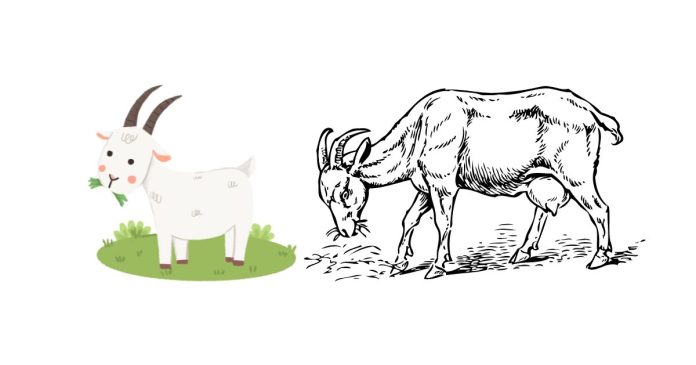Goats are known for their curious and adventurous eating habits. They seem to nibble on almost anything in sight—whether it’s grass, shrubs, or even the occasional piece of clothing! But what exactly do goats eat? Understanding their diet is essential for anyone raising goats, as it ensures they remain healthy and happy. In this blog post, we’ll explore the various types of food that goats eat, their nutritional needs, and how you can provide them with a balanced diet.
What Do Goats Eat in the Wild?
In the wild, goats are browsers, not grazers. This means that unlike cows or sheep, which mostly graze on grass, goats prefer to eat shrubs, leaves, twigs, and plants with a more varied texture. Their natural diet consists of:
- Shrubs and bushes: Goats enjoy eating leaves, twigs, and branches from bushes or trees.
- Weeds and grasses: Though they aren’t as focused on grass as other animals, goats do nibble on grass when it’s available.
- Herbs: Goats are drawn to aromatic herbs like mint, thyme, and basil.
- Fruits and vegetables: Goats also enjoy eating fruits and vegetables when they can find them, such as apples, bananas, carrots, and pumpkins.
One of the most fascinating things about goats is their ability to adapt to a wide variety of environments and food sources. Their natural diet consists of fibrous, high-fiber plants that help promote healthy digestion and keep their rumen functioning properly.
What Do Domestic Goats Eat?
While domestic goats may have access to different types of food compared to wild goats, their diet should still mirror their natural eating habits. A healthy, balanced diet is essential for their overall well-being. Here are the main components of a domestic goat’s diet:
- Hay
Hay is the staple food for most goats, especially during the winter months when fresh grass isn’t available. Alfalfa hay is often given to young goats, pregnant or lactating goats, and those that need to gain weight, as it’s rich in calcium and protein. Grass hay, such as timothy or orchard grass, is typically recommended for adult goats as it’s lower in protein and calcium, helping to prevent issues like kidney problems or urinary calculi. - Grain and Pellets
Depending on the goat’s age, breed, and activity level, you may feed them grain or pelleted feed. These are often specially formulated to meet their nutritional needs, providing the necessary vitamins, minerals, and energy. For adult goats, grain is usually given as a supplement, while younger goats or those with higher energy requirements might need more. - Fresh Grass and Pasture
Goats love grazing, and access to a fresh pasture full of grass, herbs, and weeds is ideal. Pasture allows goats to browse naturally, consuming a variety of plants that provide them with essential nutrients. However, be cautious with overgrazing, as goats can quickly deplete pasture if not rotated properly. - Fruits and Vegetables
Goats enjoy a variety of fruits and vegetables. They can be a great way to supplement their diet with extra nutrients. Common fruits and veggies that goats enjoy include:- Apples (without seeds)
- Bananas
- Carrots
- Pumpkins
- Sweet potatoes
Be sure to avoid giving goats any toxic foods, such as onions, chocolate, or avocado, as these can be harmful to their health.
- Mineral Supplements
Goats also need access to mineral supplements that provide essential nutrients like calcium, phosphorus, and salt. Loose mineral blocks or a free-choice mineral supplement will help meet these needs, as goats often lick salt or minerals to satisfy their nutritional requirements.
What Foods Should Goats Avoid?
While goats are known for their curious eating habits, some foods can be harmful to them. As a goat owner, it’s important to know what not to feed them to keep them healthy. Here are some foods that should be avoided:
- Toxic plants: Goats may accidentally eat plants that are toxic to them, including plants like azaleas, lilies, rhododendrons, and ivy.
- Chocolate: Like many animals, goats are sensitive to chocolate, which can cause serious health issues.
- Onions: Onions can cause digestive problems and even damage red blood cells in goats.
- Avocados: Avocados contain a substance called persin, which can be toxic to goats and other animals.
- Processed foods: Goats should avoid processed or salty human foods, as these can upset their digestive systems.
Goats are versatile eaters, and their diet can consist of a variety of plant materials. From browsing on shrubs and leaves in the wild to enjoying hay, fresh pasture, and fruits in a domestic setting, goats have specific dietary needs that must be met to maintain their health and vitality. Providing them with a mix of hay, grains, fresh plants, and occasional fruits and vegetables, along with access to mineral supplements, will help keep them healthy.
By understanding what goats eat, you can ensure they receive the right balance of nutrition, leading to happy, healthy animals. Just remember: goats may be willing to nibble on almost anything, but they thrive on a well-balanced diet that supports their unique digestive system.


